President Emomali Rahmon Addresses Third Meeting of Water and Climate Coalition Leaders in Dushanbe
Read also

Distinguished Secretary General!
Dear Coalition leaders!
Ladies and Gentlemen!
At the outset, I would like to welcome you in Tajikistan.
Our today’s meeting is taking place on the sidelines of the Second Dushanbe Conference on the International Decade for Action “Water for Sustainable Development”, 2018 – 2028.
The main purpose of this event is to accelerate and implement the previous commitments and to facilitate new actions.
The analysis shows that, despite significant efforts, we are far behind in achieving the Sustainable Development Goals, in particular in the water sector.
The implementation of these goals requires further commitments and undertaking new practical measures.
It is gratifying that the Water-Climate Coalition leaders also pay special attention to this area, and do their utmost to develop and implement new initiatives.
I believe today we will approve our Action Plan and its implementation will bring the desired results in addressing water and climate issues.
This action will also be our relevant contribution to the preparations for the 2023 UN Water Conference.
As you are aware, the next year conference will be held under the co-chairmanship of the Republic of Tajikistan and the Kingdom of the Netherlands.
In this context, we will undertake efforts to ensure the linkage between water and climate issues becomes a central theme of this important global forum.
It should be noted that the Dushanbe Conference, as a key event for preparation to the 2023 Conference, will also focus on the close linkage between water resources and climate change.
Ladies and Gentlemen!
An integrated system of water and climate solutions is also very important for Tajikistan, as water resources play a key role in the sustainable development of our country.
However, currently, these vital resources are under a severe impact of the climate change, though Tajikistan is not among the industrial countries and 98% of our electricity is generated by hydropower facilities with the use of renewable and environment-friendly resources.
We have raised the issue of the rapid melting of glaciers and the dramatic consequences of this process in various high-level events on many occasions.
This issue is indeed crucial since glaciers are the main source of fresh water and their resources are rapidly declining under the impact of global warming.
According to the Report on Oceans and Cryosphere by the Intergovernmental Panel on Climate Change, a third of the world’s glaciers can destroy by the end of this century.
More than a thousand glaciers have got destroyed in our country over the past few decades alone, and the total volume of glaciers in the country has decreased by almost a third.
Experts estimate that the last three years have been the hottest in the history of meteorological observations on the planet.
Obviously, the continuation of this process, given the rapid increase in water demand due to population growth and economic development, will lead to negative consequences.
The situation with water supply in Central Asia is a vivid example of this statement.
While in the 60s of the last century water supply per capita in the region was more than 8.000m3 per annum, today this figure has decreased by four times.
Another factor related to this process is the dynamic increase in the region’s population.
Naturally, this topical issue should be in the center of attention of the world community.
This is the reason, in our first meeting of leaders in March last year, I proposed to declare the 2025 as the International Year for the Protection of Glaciers.
Today we are working at all levels to implement this initiative.
It is my firm belief that this proposal, which is included into our Plan of Action with the support of our distinguished leaders, will also find the full support of the international community.
The declaration of World Glacier Day, the creation of the International Glacier Protection Fund, the establishment of the Integrated Global Cryosphere Information Network and the international mechanism will be significant results of this initiative.
These measures will facilitate access to accurate and timely information about the cryosphere.
All these results will decently contribute to the creation of the Global Water Information Network, which is implemented by the World Meteorological Organization within the framework of our Coalition.
Dear Coalition Leaders!
A recent report by the Intergovernmental Panel on Climate Change notes that this process is accelerating faster than expected and is limiting the possibilities for action.
Adaptation is one of the key elements in this process, and the implementation of appropriate measures must be strengthened by governments and other key players.
Indeed, water resources play an important role in adaptation. They are also important for threat reduction and resilience.
At this point, I would like to draw your attention to one more point, which is a clear indication of this statement. This is the development of the hydropower sector, which is the generator of «green energy».
According to the World Hydropower Association, strengthening this sector, along with economic development, can also play a key role in adapting to the consequences of climate change. The report highlights that world needs around an additional 850 GW of new hydropower to keep global warming below 2 degrees Celsius. More than 1,200 gigawatts of additional hydropower would be needed to limit temperature rise to below 1.5 degrees Celsius.
Currently, design and construction of hydropower plants with the capacity of 600GW is ongoing and more than 600GW of additional hydropower will be needed.
We are currently constructing the Roghun hydropower plant with the capacity of 3600 MW in Tajikistan thanks to our abundant hydropower resources.
Along with generating green and affordable electricity, the plant will also make a significant contribution to sustainable water management by reducing the risk of floods, droughts and greenhouse gas emissions.
Experts estimate that if 17 billion kilowatt-hours (kWh) of electricity generated at the Roghun HPP were generated by coal-based power plants, CO2 emissions would be more than 13.7m tons, and it would be 9.9m tons in case of oil and more than 6.7m tons in case of natural gas.
Thus, Roghun will make a significant contribution to reducing carbon emissions.
We believe that the Coalition will continue to pay attention to this issue given its importance in comprehensively addressing the water and climate issues.
Ladies and Gentlemen,
We highly appreciate the role of the Coalition leaders in promoting the integrated water and climate agenda. The leaders’ Plan of Action would make its worth contribution in this process.
Taking this opportunity, we once again express our commitment for the implementation of the Action Plan of the Coalition leaders and the promotion of a concerted water and climate agenda at all levels.
The Dushanbe Water Conference, the Ocean Conference in Portugal, the 27th session of the United Nations Climate Change Convention in Egypt and of course the 2023 United Nations Water Conference are just some of the opportunities we should take advantage of.
I strongly believe that the Water and Climate Coalition Leaders will make a valuable contribution to further consolidate the efforts of the international community and, in particular, political leaders, to strengthen and accelerate action in this area.
I wish all of us success in this endeavor!
I thank you for your attention!











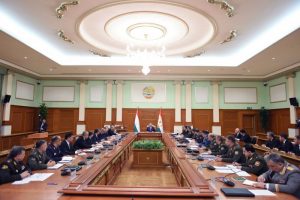 President Emomali Rahmon Holds Security Council meeting
President Emomali Rahmon Holds Security Council meeting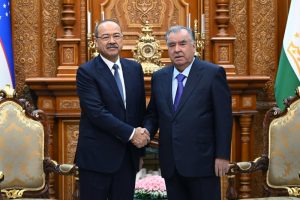 President Emomali Rahmon Receives the Prime Minister of the Republic of Uzbekistan Abdulla Aripov
President Emomali Rahmon Receives the Prime Minister of the Republic of Uzbekistan Abdulla Aripov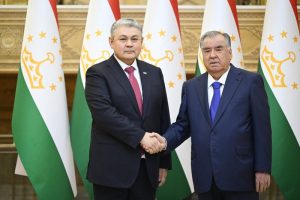 President Emomali Rahmon, Received the Minister of Foreign Affairs of the Republic of Kazakhstan
President Emomali Rahmon, Received the Minister of Foreign Affairs of the Republic of Kazakhstan President Emomali Rahmon Enacts New Laws
President Emomali Rahmon Enacts New Laws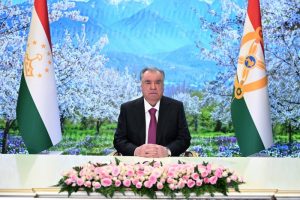 President Emomali Rahmon Sends Festive Greetings to President Xi for Chinese New Year
President Emomali Rahmon Sends Festive Greetings to President Xi for Chinese New Year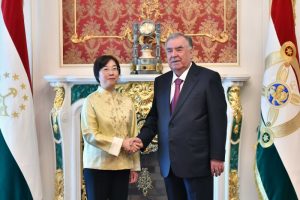 President Emomali Rahmon Receives AIIB President Zou Jiayi in Dushanbe
President Emomali Rahmon Receives AIIB President Zou Jiayi in Dushanbe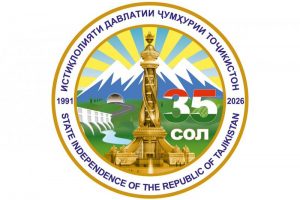 President Emomali Rahmon Approves Emblem for the 35th Anniversary of Tajikistan’s State Independence
President Emomali Rahmon Approves Emblem for the 35th Anniversary of Tajikistan’s State Independence President Emomali Rahmon Holds Working Meeting with Heads of Security and Law Enforcement Agencies
President Emomali Rahmon Holds Working Meeting with Heads of Security and Law Enforcement Agencies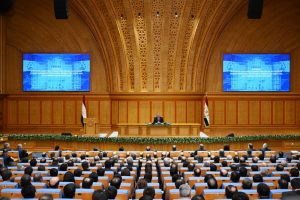 Expanded meeting of the Government of the Republic of Tajikistan
Expanded meeting of the Government of the Republic of Tajikistan














